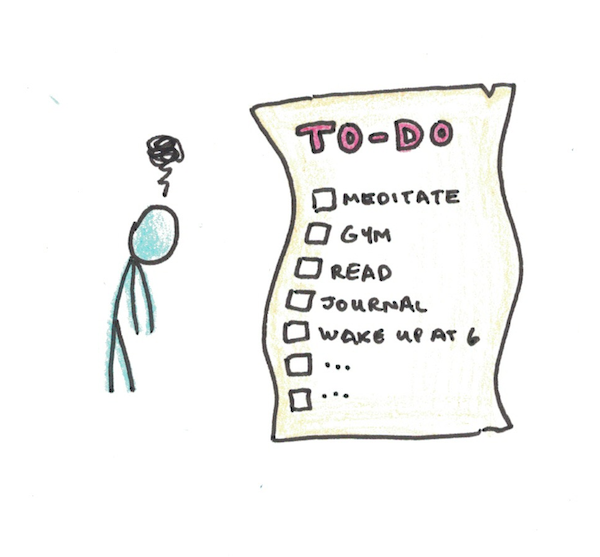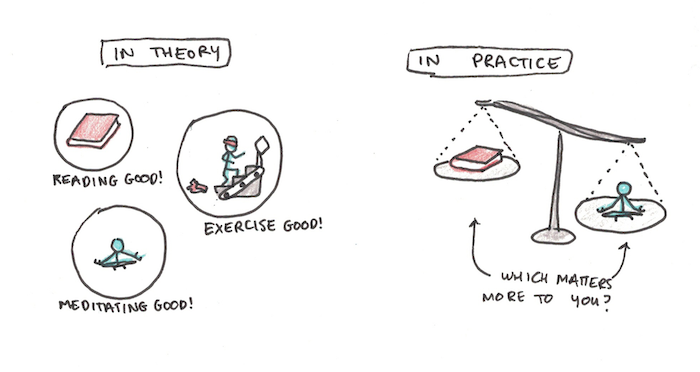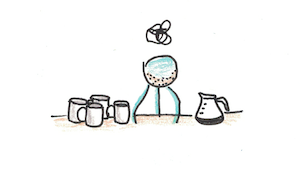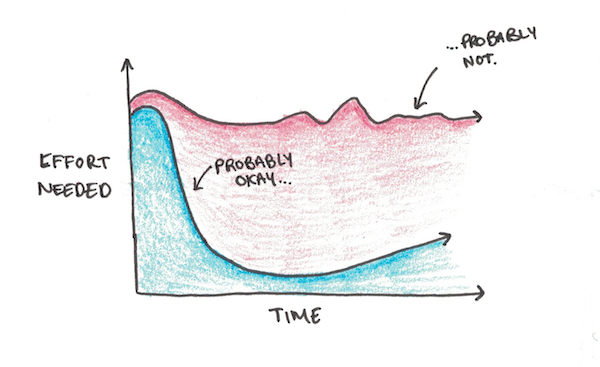
Wake up at 5am. Read a book a week. Exercise every day—but make sure it’s high-intensity or it doesn’t count. Journal. Meditate. Volunteer.
Living well sounds exhausting. Maybe it’s just easier to flop down and watch Netflix?
Productivity guilt happens when you feel overwhelmed by all the things you know you “should” be doing. You don’t do them, but you still have that nagging feeling like you’re wasting time.
If you feel that guilt, I’m partly to blame. I write a lot about how to live better, and sometimes all those suggestions can start to feel more like burdens than helpful advice.
If living well sounds exhausting, what should you do about it? Should you just ignore all that advice as posturing from overachievers? Or should you beat yourself up for not reaching some hypothetical ideal?
Exposing the Hidden Contradictions of Life Advice
Part of the problem is that suggestions are almost always given on their own. So you can read about why exercise, reading, meditating or gratitude journaling are good on their own, but rarely about how they trade off against each other.
After all, you only have a certain number of hours in the day. If you’ve got a busy job, studies or family, at some point you’re simply going to run out of time.
There have always been trade-offs. If you’re meditating for an hour every day, that might cut into your gym routine. Or social life. Or reading habits. Or something else…

In practice, the fewer things you’re trying to stick to at the same time, the less there is room for conflict. If you’re only worrying about exercise, it’s probably not so hard to stick with that and simply reduce the amount of time you waste on obviously trivial things. However, when you start trying to add fifty other suggestions for living well you’ll find they start to conflict with each other.
Prioritizing these different ideas is under-discussed, perhaps because it’s messy, complicated and different people disagree. It’s easy to say “Exercise more!” It’s more controversial to say, “Exercise more and read fewer books,” yet the first does hint at the second, if only implicitly.
What If You Have Time, But You’re Just Too Tired to Do Everything?
Even if your timetable isn’t so compressed that it’s literally impossible to fit some added activity in, sometimes you’re just too tired to do all the stuff you should. As in, you know you could read a book and learn something enlightening, but randomly scrolling Twitter feels like less work.
Is it simply the case that your energy is limited, and if you put in effort in one area of your life, you’re necessarily sucking it away from another area?

This is a common view, but the research shows it’s actually a lot more complicated. Roy Baumeister helped develop the view of ego depletion, which basically means exactly this idea: exerting willpower is hard, it depends on a finite store, and when that store is depleted you succumb to temptations more easily.
Except ego depletion hasn’t stood up as well as a scientific concept after more rigorous replications. Indeed, there’s research that shows that the way you think of your own willpower affects its depletion. If you believe that you’re “energized” by doing hard things, you tend not to get depleted after exerting willpower. If there really were a physical store of energy, then your beliefs about it shouldn’t affect it. Yet they do.
More research is still needed to determine exactly what biological mechanisms go into feeling fatigued, especially when the fatigue is purely mental. However, it’s likely to be a lot more nuanced than simply burning up energy from a fuel reserve.
Two Types of Tired
In my own life, I like to contrast two different types of feeling tired when deciding whether to push forward with more effortful activities or give myself a break.

The first kind of tired is felt mostly as you’re initiating an activity. This is the feeling you have as you think about going to the gym, but it sounds hard and frustrating and maybe you should just watch another episode of The Office first.
However, once you actually get to the gym, your mood changes. Suddenly it’s not so bad and when you get home after you’re glad you went.
The second kind of fatigue persists throughout the activity itself. You’ve decided to read a hard book for fun. Except it’s not really so much fun as it is a slow torture. Your mind darts every fifteen seconds and you struggle with pushing through more than five minutes of it.
The first kind of fatigue doesn’t seem to match up with the energy metaphor much at all. In this case, you think the activity will be exhausting, but when you actually get going, it doesn’t feel so bad. The effort is all in the starting, not the doing.
This is the kind of feeling you want to push through. If you can overcome that initial hiccup to taking action, everything gets much easier.
The second kind of feeling might be something you encourage yourself to do for specific goals, but if your entire life feels that way for weeks at a time, your habits are probably unsustainable.
How to Design a Better Life (Guilt Free)
First, realize that you actually cannot do everything you should. You can’t even do everything you want to do. That’s okay, that’s just the normal constraint of living in a world where time isn’t infinite.
Therefore, it’s totally okay to acknowledge that there’s a trade-off between different pursuits. You might want to meditate an hour every day, but recognize that this will cut into your gym habit. Or you might decide that waking up early is going to cut into your social life.
I won’t decide which you ought to prioritize—that’s for you to choose. I’m not even consistent with how I make this choice. At some points in my life, I’ve prioritized my health and fitness, other times my social life, reading or some other activity. While, in theory, there’s enough time for everything, in practice there are almost always trade-offs.
Second, make a distinction between a lack of inertia and persistent exhaustion from an activity being more hassle than help. If you push yourself to the gym, but feel good after you went, that’s good. On the other hand, if you constantly feel exhausted by everything, you might be pushing yourself towards burn out.
Finally, live well for your own sake, not because somebody told you that you should. Beating yourself up because you don’t reach someone else’s idea of perfection is the best way to make yourself miserable.


 I'm a Wall Street Journal bestselling author, podcast host, computer programmer and an avid reader. Since 2006, I've published weekly essays on this website to help people like you learn and think better. My work has been featured in The New York Times, BBC, TEDx, Pocket, Business Insider and more. I don't promise I have all the answers, just a place to start.
I'm a Wall Street Journal bestselling author, podcast host, computer programmer and an avid reader. Since 2006, I've published weekly essays on this website to help people like you learn and think better. My work has been featured in The New York Times, BBC, TEDx, Pocket, Business Insider and more. I don't promise I have all the answers, just a place to start.